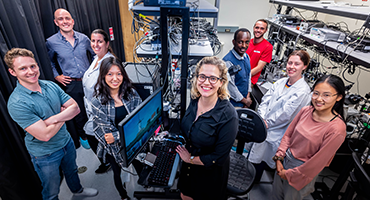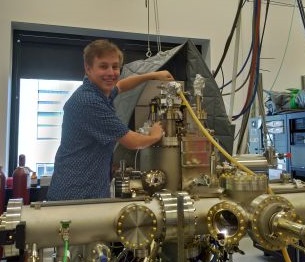Learning through research - how USRA recipients make the most out of their research experiences

Every year, the department provides undergraduate summer research awards (USRAs) and summer research opportunities to students. These positions are often the first time students dip their toes into research, and get a chance to explore their passions in physics and astronomy.
For many, it is an opportunity to go beyond what they learned in a classroom setting, and see how scientific research is done. "Working in an environment where my colleagues and I analyze data from cutting-edge Instruments, from different continents, gave me invaluable experience," shared Keshaw Gopinath, a student studying Physics & Computer Science. He worked with Dr. Allison Man to investigate the metallicity content and gas motions of a candidate group of lensed galaxies, and developed Python scripts to conduct measurements on hundreds of galaxy spectra. "I learned how research is done and was able to identify aspects of the work that I enjoyed, which would certainly inform my decisions on the kind of work I would like to do in the future."
Sometimes this requires picking up new skills and knowledge along the way. Sarah Wang, a third year Physics student, talked about how her job with Dr. Sabrina Leslie advanced her overall understanding of coding, math, and physics. "Due to my relatively rudimentary knowledge in coding and script writing, my computer science knowledge definitely improved by leaps and bounds while working at this lab. Not only was I able to learn about particle tracking, a completely foreign subject to me, I was able to explore and relate my existing math/physics knowledge including Brownian motion and random walks."

Stuart Blusson Quantum Matter Institute
It can be quite exciting to get access to unique equipment that you didn't even know existed. Dante Prins, now in his fourth year in Engineering Physics, said that one of the biggest highlights of his USRA experience at Dr. Ke Zou's Molecular Beam Epitaxy Lab was the exposure he got to an abundance of industry-standard condensed matter tools and methods, such as atomic force measurement, scanning tunneling microscopy, and angle-resolved phot-emission spectroscopy systems. "All these specialized tools were used to help characterize and quantify nanometre-thick films grown in our ultra-high vacuum Molecular Bean Epitaxy system, which was an exciting (and very large) piece of technology to work with."
For others, the connections they made contributed to an rewarding experience. "Getting to present at so many events to a wide range of audiences was an incredible experience; the practice I got and the new connections I made were of huge value to me as I start out my career as a researcher," mentioned third year Physics and Math student Seraphim Jarov. Searaphim worked with Dr. Jess McIver on gravitational waves research as part of the Laser Interferometer Gravitational-Wave Observatory (LIGO) collaboration. Julian Ding, a fourth year Math and Computer Science student who also worked in Jess' lab in the summer, shared how impressed and inspired he was with the collaborative nature of research. "The true scale of the LIGO collaboration is mind-boggling to me," Julian pointed out. "I slowly began to glimpse the extent of my relationship with the collaboration through meetings at larger and larger scales, but even through all the calls and conferences I know I've barely scratched the surface. At the risk of sounding corny, the fact that so many people came together to make a project this big come to fruition gives me hope for mankind."
In the end, students come away with new skills, new knowledge, and the chance to put what they learned into practice. Interested in joining a summer research position this year? Applications for UBC Physics & Astronomy USRAs are open each year from December 1st until January 31st. Make sure to check out the department web page for more information!
Learn more
- Review BC Physics & Astronomy USRA application guidelines: including USRAs opportunities by Natural Sciences and Engineering Research Council Summar Student Research Awards (NSERC USRAs), UBC Science Undergraduate Research Experience (SURE) Awards and UBC Work Learn International Research Awards (WLIURA).
- Read comments from 2021 PHAS USRA students
- See a partial list of available Summer 2022 USRA projects hosted at UBC; If people with whom you are especially interested in working with do not have any jobs posted, feel free to contact them (email is usually best) to find out if they have possible summer research projects.